

Apricot, grows on the apricot tree, Prunus armeniaca. It is part of the Rosaceae genus.
This soft, sweet summer fruit contains key nutrients that make us healthy. Beta-carotene and many trace elements answer our body’s needs. Moreover, the tree’s leaves and fruit stones are great to treat ailments such as rashes and more.
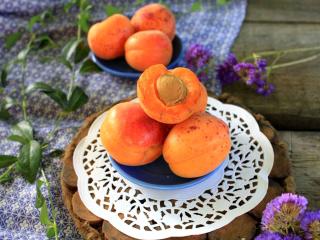
Apricot plants traveled with merchants from the Far and Middle East, and ended up with the Greeks and Romans.
Romans called it “praecoquum”, which means “early”.
Apricots were long to establish themselves in Europe. Louis the XIVth and his gardener are the persons to thank for apricot gaining popularity there.
Apricot trees love heat, and depending on the area and the variety, produce apricots in June for early varieties until August for the later ones.
Many cultivars have been developed: ‘Bergeron’, ‘Lambertin’, ‘Rouge du Roussillon’, ‘Orange de Provence’…
Overall indications for apricot include: vision, constipation, indigestion, anemia, osteoporosis, pharyngitis, hemorrhoids, sore throat, rheumatism.
Apricots have high beta-carotene levels (2000 micrograms / 3.5 oz (100 g)), a pigment used in elaborating vitamin A that gives them their beautiful orange color. It is crucial for growth and tooth and bone protection.
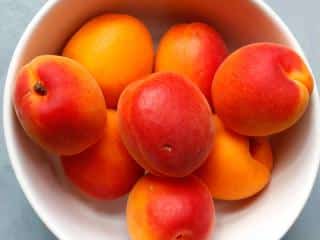
As for eyes, beta-carotene also is involved in identifying colors. It also contributes to the defense of the body as it strengthens the immune system.
Beta-carotene also reduces bad cholesterol.
It is also a great antioxidant thanks to the vitamin C (10 mg / 3.5 oz (100 g)), B (0.96 / 3.5 oz (100 g)) and pro-A (beta-carotene) that watch over cell regeneration, preventing appearance of cardiovascular diseases and cancers.
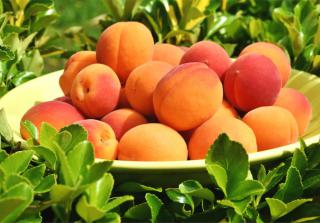
Apricots contain 2% fiber, which eases intestinal transit and smooths digestion. Ideal for burdened intestines and to eliminate toxins.
Apricot and its fibers are effective in case of hemorrhoids.
Apricots are a great source of essential minerals and trace elements:
 Potassium: 315 mg / 3.5 oz (100 g), essential for heart muscle contraction.
Potassium: 315 mg / 3.5 oz (100 g), essential for heart muscle contraction.Sport enthusiasts love dried apricot, since they provide 45 kcal / 3.5 oz (100 g). On top of its energizing properties, it also reduces cramps.
Apart from eating the fruit, you can use the tree’s leaves as well:

Taken in infusions, apricot tree leaves soothe throat ailments and irritation. It is also excellent for eliminating toxins.
Used as decoction, apricot leaves soothe inflammations and skin rashes.
In case of dysentery: juice extracted from apricot tree leaves and diluted seems to be effective in treating dysentery.
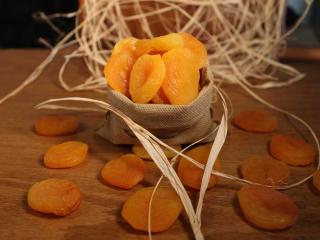
Apricot stone oil is an excellent anti-inflammatory. It is recommended in case of rheumatism.
It soothes muscle pain as well as joint and nasal or face pain.
Apricot stone pits can be toxic if used in excessive quantities.
They contain small amounts of amygdalin which the body transforms into cyanide.
A single pit isn’t dangerous, but 5 or more may lead to hospitalization.
In summer, apricots are eaten both raw and cooked.
They are delicious raw, dried, baked in crumbles with sliced almonds, in syrups, in mixed or Caesar salads, in fruit salads or in smoothies.
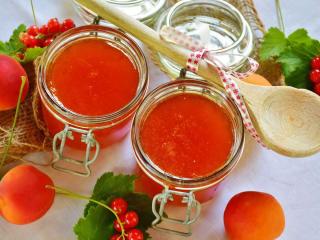
Apricots are delicious cooked together with dried plum to flavor chicken, tajine, and with roast pork.
In pies, apricots can be quite tangy. Layer equal parts sugar and flour along the bottom of your pastry dough.
Dried apricots are a great reviver before or after physical exercise.
Apricot oil extracted from the fruit’s stone has many beneficial properties for your body. It helps promote tanning, nourishes the body, tones and softens skin.
Additionally, it nourishes hair and reduces hair loss.

How to prepare an apricot mask: Blend 3 apricots, with 2 table spoons cottage cheese and the juice from half a lemon. Apply on skin and then rinse. It hydrates the skin, closes its pores, softens it and gives the skin a luscious glow.
Keeping apricots: at room temperature, in a bowl.